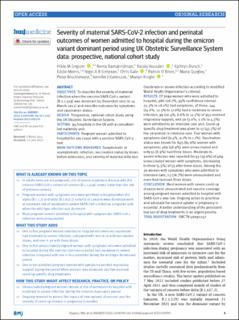| dc.contributor.author | Engjom, Hilde Marie | |
| dc.contributor.author | Ramakrishnan, Rema | |
| dc.contributor.author | Vousden, Nicola | |
| dc.contributor.author | Bunch, Kathryn | |
| dc.contributor.author | Morris, Eddie | |
| dc.contributor.author | Simpson, Nigel A.B. | |
| dc.contributor.author | Gale, Chris | |
| dc.contributor.author | O'Brien, Patrick | |
| dc.contributor.author | Quigley, Maria | |
| dc.contributor.author | Brocklehurst, Peter | |
| dc.contributor.author | Kurinczuk, Jennifer J. | |
| dc.contributor.author | Knight, Marian | |
| dc.date.accessioned | 2023-04-28T11:11:57Z | |
| dc.date.available | 2023-04-28T11:11:57Z | |
| dc.date.created | 2022-10-14T10:17:12Z | |
| dc.date.issued | 2022 | |
| dc.identifier.citation | BMJ Medicine. 2022, 1 (1), . | |
| dc.identifier.issn | 2754-0413 | |
| dc.identifier.uri | https://hdl.handle.net/11250/3065512 | |
| dc.description.abstract | Abstract Objectives To describe the severity of maternal infection when the omicron SARS-CoV-2 variant (B.1.1.529) was dominant (15 December 2021 to 14 March 2022) and describe outcomes by symptoms and vaccination status. Design Prospective, national cohort study using the UK Obstetric Surveillance System. Setting 94 hospitals in the UK with a consultant led maternity unit. Participants Pregnant women admitted to hospital for any cause with a positive SARS-CoV-2 test. Main outcome measures Symptomatic or asymptomatic infection, vaccination status by doses before admission, and severity of maternal infection (moderate or severe infection according to modified World Health Organization's criteria). Results Of 3699 women who were admitted to hospital, 986 (26.7%, 95% confidence interval 25.3% to 28.1%) had symptoms; of these, 144 (14.6%, 12.5% to 17.0%) had a moderate to severe infection, 99 (10.4%, 8.6% to 12.5%) of 953 received respiratory support, and 30 (3.0%, 2.1% to 4.3%) were admitted to an intensive care unit. Covid-19 specific drug treatment was given to 13 (43.3%) of the 30 women in intensive care. Four women with symptoms died (0.4%, 0.1% to 1.1%). Vaccination status was known for 845 (85.6%) women with symptoms; 489 (58.9%) were unvaccinated and only 55 (6.5%) had three doses. Moderate to severe infection was reported for 93 (19.0%) of 489 unvaccinated women with symptoms, decreasing to three (5.5%) of 55 after three doses. Among the 30 women with symptoms who were admitted to intensive care, 23 (76.7%) were unvaccinated and none had received three doses. Conclusion Most women with severe covid-19 disease were unvaccinated and vaccine coverage among pregnant women admitted to hospital with SARS-CoV-2 was low. Ongoing action to prioritise and advocate for vaccine uptake in pregnancy is essential. A better understanding of the persistent low use of drug treatments is an urgent priority. | |
| dc.description.abstract | Severity of maternal SARS-CoV-2 infection and perinatal outcomes of women admitted to hospital during the omicron variant dominant period using UK Obstetric Surveillance System data: prospective, national cohort study | |
| dc.language.iso | eng | |
| dc.title | Severity of maternal SARS-CoV-2 infection and perinatal outcomes of women admitted to hospital during the omicron variant dominant period using UK Obstetric Surveillance System data: prospective, national cohort study | |
| dc.title.alternative | Severity of maternal SARS-CoV-2 infection and perinatal outcomes of women admitted to hospital during the omicron variant dominant period using UK Obstetric Surveillance System data: prospective, national cohort study | |
| dc.type | Peer reviewed | |
| dc.type | Journal article | |
| dc.description.version | publishedVersion | |
| dc.source.pagenumber | 10 | |
| dc.source.volume | 1 | |
| dc.source.journal | BMJ Medicine | |
| dc.source.issue | 1 | |
| dc.identifier.doi | 10.1136/bmjmed-2022-000190 | |
| dc.identifier.cristin | 2061411 | |
| dc.relation.project | Norges forskningsråd: 320181 | |
| cristin.ispublished | true | |
| cristin.fulltext | original | |
| cristin.qualitycode | 1 | |
